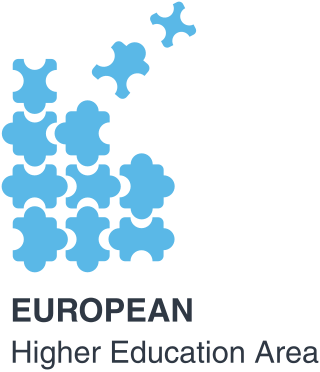
The European Higher Education Area (EHEA) was launched in March 2010, during the Budapest-Vienna Ministerial Conference, on the occasion of the 10th anniversary of the Bologna Process.

The Common Security and Defence Policy (CSDP) is the European Union's (EU) course of action in the fields of defence and crisis management, and a main component of the EU's Common Foreign and Security Policy (CFSP).

The Southeast European Cooperative Initiative (SECI) is a multilateral regional initiative that has been initiated by the European Union, the United States of America and the countries of Southeast Europe within the framework of the Organization for Security and Cooperation in Europe (OSCE) as a support to the implementation of the Dayton Accords in December 1996 at the inaugural session at Geneva on the basis of Final Points of Common EU-USA Understanding.

International relations between the European Union (EU) and Ukraine are shaped through the Ukraine–European Union Association Agreement and the Deep and Comprehensive Free Trade Area (DCFTA). Ukraine is a priority partner within the Eastern Partnership and the European Neighbourhood Policy (ENP). The EU and Ukraine have been seeking an increasingly close relationship, going beyond co-operation, to gradual economic integration and deepening of political co-operation. On 23 June 2022, the European Council granted Ukraine the status of a candidate for accession to the European Union.

The 2nd European Union - African Union Summit, which was held on 8 December – 9 December 2007 in Lisbon, Portugal, was the second summit between heads of state and government from EU and Africa. It was hosted by Portugal, the holder of the EU's rotating presidency. During the summit, the "Joint EU-Africa Strategy", the "Action Plan" and the "Lisbon Declaration" were adopted.
The Salzburg Forum (SF) is a Central European security partnership of Austria, Bulgaria, Croatia, the Czech Republic, Hungary, Poland, Romania, Slovakia and Slovenia. Member states cooperate in areas of police cooperation, illegal immigration, witness protection, fight against drugs, traffic safety and other areas of internal security. They also focus on positions coordination and advancing common interests in the European Union in the area of Home Affairs. At least two conferences of interior ministers per year are held. As a rule, three SF ministerial meetings are held per year. One meeting takes place in the country holding the presidency and one further meeting is usually held in summer in Austria. In addition, ministers regularly meet in the margins of EU Council meetings.

Poland–Ukraine relations revived on an international basis soon after Ukraine gained independence from the Soviet Union in 1991. Various controversies from the shared history of the two countries' peoples occasionally resurface in Polish–Ukrainian relations, but they tend not to have a major influence on the bilateral relations of Poland and Ukraine.
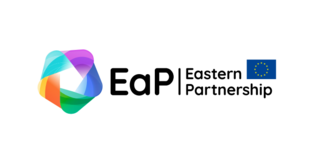
The Eastern Partnership (EaP) is a joint initiative of the European Union, together with its member states, and six Eastern European countries. The EaP framework governs the EU's relationship with the post-Soviet states of Armenia, Azerbaijan, Belarus, Georgia, Moldova, and Ukraine. The EaP is intended to provide a forum for discussions regarding trade, economic strategy, travel agreements, and other issues between the EU and its Eastern European neighbours. It also aims at building a common area of shared values of democracy, prosperity, stability, and increased cooperation. The project was initiated by Poland and a subsequent proposal was prepared in co-operation with Sweden. It was presented by the foreign ministers of Poland and Sweden at the EU's General Affairs and External Relations Council in Brussels on 26 May 2008. The Eastern Partnership was inaugurated by the EU in Prague, Czech Republic on 7 May 2009.
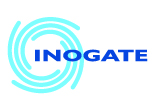
Interstate Oil and Gas Transportation to Europe (INOGATE) was an international energy co-operation programme between the European Union (EU), the littoral states of the Black and Caspian seas and their neighbouring countries. The programme was operational from 1996 to 2016.

The Union for the Mediterranean is an intergovernmental organization of 43 member states from Europe and the Mediterranean Basin: the 27 EU member states and 16 Mediterranean partner countries from North Africa, Western Asia and Southern Europe. It was founded on 13 July 2008 at the Paris Summit for the Mediterranean, with an aim of reinforcing the Euro-Mediterranean Partnership (Euromed) that was set up in 1995 as the Barcelona Process. Its general secretariat is located in Barcelona, Catalonia, Spain.

European Union–Pakistan relations are the international relations between the common foreign policy and trade relations of the European Union and the Islamic Republic of Pakistan.
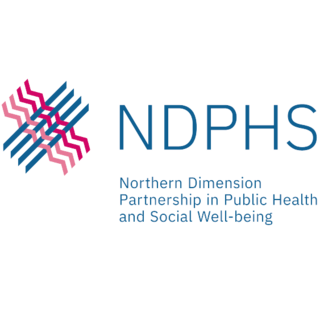
The Northern Dimension Partnership in Public Health and Social Well-being (NDPHS) is an international networking platform for strengthening professional connections, sharing and co-creating knowledge, and developing joint activities in public health and social well-being. The Partnership is served by the NDPHS Secretariat that was established in 2012 as an international legal entity hosted by the Swedish Government located in Stockholm and funded jointly by the Partner Countries.

The State Ministry for Euro-Atlantic Integration of Georgia was a government agency within the Cabinet of Georgia in charge of coordination and monitoring of activities undertaken towards integration of Georgia with the European Union and NATO from 2004 to 2017.

The International Centre for Migration Policy Development (ICMPD) is an international organisation which makes policy recommendations on migration-related issues to governments and intergovernmental agencies. Founded by Austria and Switzerland as a think tank in 1993, and headquartered in Vienna. As of May 2023 ICMPD was composed of 20 member states.

Ingrida Šimonytė is a Lithuanian politician, public servant and economist who is serving as the 17th and current prime minister of Lithuania since 2020. She has been a Member of the Seimas for the Antakalnis constituency since 2016 and was Minister of Finance in the second Kubilius cabinet from 2009 until 2012. Šimonytė was a candidate in the 2019 presidential election, but lost in the second round runoff to Gitanas Nausėda. She has been a member of Homeland Union since 2022, having previously been an independent politician.

Mikheil Janelidze is a chairman of Center for European Governance & Economy. He is a former Georgian government official who served as Vice Prime Minister (2017–2018), Minister of Foreign Affairs (2015–2018), First Deputy Minister of Foreign Affairs (2015) and Deputy Minister of Economy and Sustainable Development of Georgia (2011-2015).
The Prague European Summit is a platform for a regular high-level strategic debate on the future of the European Union and other European issues. It is the only platform of this kind focused on the European Union in Central and Eastern Europe. It offers space for an informal dialogue among political representatives, high-ranking state officials, representatives of interest groups, businessmen, academicians and journalists.
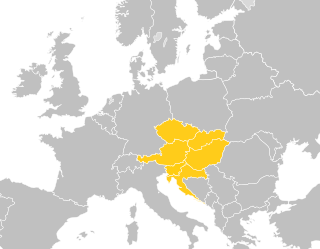
The Central European Defence Cooperation (CEDC) is a military collaboration consisting of the Central European states of Austria, Croatia, the Czech Republic, Hungary, Slovakia and Slovenia. Poland has an observer status in this cooperative framework.

Military Mobility is one of the initial projects launched under the European Union's (EU) Permanent Structured Cooperation in Defence (PESCO) facility. It is commonly termed a "Military Schengen" as it is inspired by the EU's Schengen Area, but designated to aid the free movement of military units and assets throughout Europe via removal of bureaucratic barriers and improvement of infrastructure.

The European Green Deal, approved in 2020, is a set of policy initiatives by the European Commission with the overarching aim of making the European Union (EU) climate neutral in 2050. The plan is to review each existing law on its climate merits, and also introduce new legislation on the circular economy, building renovation, biodiversity, farming and innovation.


















